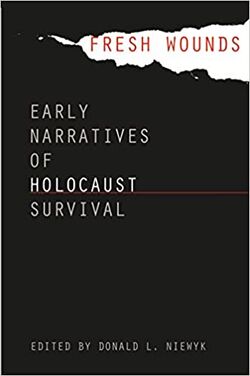Israel Unikowski (M / Poland, 1928), Holocaust survivor
Israel "Jack" Unikowski (M / Poland, 1928), Holocaust survivor.
- KEYWORDS : <Lodz Ghetto> <Auschwitz> <Buchenwald> <Liberation of Buchenwald> / <France> <OSE Orphanage>
- MEMOIRS : Boden's Interviews -- USC Shoah Foundation
Biography
NOTES : Israel Unikowski was born in Kalish, Poland, in 1928. He lived in the local orphanage. After the German invasion of Poland in September 1939, the children went to Lodz, where they were taken into the Lodz Ghetto. He survived the liquidation of the orphanage and worked in a toymaking workshop. He was then deported to Auschwitz and from there to Buchenwald, where he was liberated. He was parrt of the group of children who were hosted in FranceOn August 2, 1946, he was one of the children interviewed by David P. Boder. He has continued to be a vocal Holocaust witness for all his life.
USHMM Profile
Israel Unikowski was born in Kalisz, Poland, in 1928. His mother died when he was just three years old. His father fled Poland in 1935. This left Israel and his older brother living in separate orphanages.
After the German invasion of Poland in September 1939, the staff of Israel's orphanage fled leaving 32 boys under the care of one adult. The group rented a cart and began the journey to Lodz.
Once the group reached Lodz, the Jewish community and Mordechai Chaim Rumkowski took over the care of the boys. In 1940, the orphans were transferred with the rest of the Jews of Lodz to the ghetto, which was later sealed. In the ghetto, Israel was reunited with his brother who had also made his way to Lodz. Israel quickly obtained a job in a tailoring workshop while living in the orphanage.
Following the Gehsperre Aktion in the Lodz ghetto, he and his brother lived together in a rented room and Israel began working in a toymaking workshop. His brother died in 1943 after becoming ill, leaving Israel alone. In 1944, Israel was deported to Birkenau where he was put a on a labor detail. The detail was eventually marched to Buchenwald where Israel was liberated.
Book : Fresh Wounds (1998), by Donald L. Niewyk
Every student of the Holocaust knows the crucial importance of survivors' testimonies in reconstructing the crime. Most such accounts, however, were recorded years or even decades after the end of World War II. The survivor narratives that make up this volume, in contrast, were gathered immediately after the war. In 1946, Russian-born American psychologist David P. Boder interviewed 109 victims of Nazi persecution--the majority of them Jews--in "Displaced Persons" camps across Europe. The thirty-six accounts collected here possess an immediacy and authenticity that might otherwise be questioned in memoirs penned long after the events they detail ... These interviews encompass survivors from Poland, Lithuania, Germany, France, Slovakia, and Hungary, ranging in age from their early teens to their seventies. Their remarkable stories shed light on such controversial subjects as relations between Jews and neighbors or strangers who extended or withheld aid, opportunities for and obstacles to Jewish resistance, the victims' knowledge--or lack of knowledge--about the fate that awaited them in Nazi hands, survival strategies, women's experience of the Holocaust, the Nazi practice of placing prisoners in charge of their fellow inmates, and the liberators' postwar treatment of freed concentration camp inmates ... In an introduction, Donald Niewyk describes this extraordinary interviewing project and traces the overwhelming obstacles Boder faced in finding an audience for the survivor narratives he collected.
OSE Orphanage List
- #366 Israel Unikowski, Poland, 1928.
